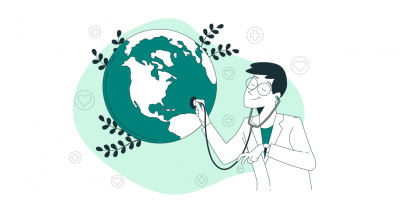
The healthcare sector nowadays has become a priority in all regions of the world.
It is the target of all efforts due to the spread of diseases.
On the same occasion, World Health Day came into existence as a celebration of the World Health Organization’s founding on the 7th of April 1948 and ever since it has turned to be an internationally celebrated day as the World Health Assembly demanded. Each year, a health-related area is put under the spotlight and is the target of awareness campaigns.
Tunisia’s achievements in the healthcare sector
We may draw attention to Tunisia’s achievements in the healthcare sector and take the opportunity to appreciate the efforts exerted by the entire medical team.
For instance, Tunisian health facilities have taken the necessary measures, especially in the last three years, to face any crisis such as COVID19, communicable diseases and so much more to enumerate. Whether it be in public or in private health entities, saving lives and ensuring the well-being of its citizens has always been the core of the health system.
According to the Medical Council, there are 130 doctors per 100.000 inhabitants, and more precisely one doctor per 769 inhabitants which automatically reflects the concern over public health.
In the same context, we can refer to the numerous medical institutions in Tunisia.
As a matter of fact, four universities of medicine have recently signed an agreement with Harvard Medical School for a better learning process.
Apart from public hospitals and parapublic institutions, Tunisia also comprises more than 92 private clinics operating in diverse specialties.

In addition, a lot of organizations support and invest in public health with the objective of raising awareness regarding different health matters such as cancer, tuberculosis, mental health… In fact, statistics confirm that life expectancy in Tunisia fluctuates around 77 years old which further highlights the importance of health in the Tunisian society.
What makes the health sector in Tunisia one of the best in the African continent is that the government and the private sector as well always attempt to provide the best quality of care and invest in cutting edge technologies that best serve patients’ needs.
High Level of Professionalism
The experts and doctors have received the best training and are ready to put their heart and soul into their job. Their professionalism and commitment make them the target of European and Gulf countries. No wonder why the first female doctor in the Maghreb countries is the Tunisian “Tawhida Ben Cheikh".
On a similar note, we can never forget to mention the medical staff of La Rose clinic who has been working very hard and has proven a high level of expertise that is best shown through patients’ satisfaction rate.
To sum up, we may say that health, similar to other sectors, is highly fundamental and that every health institution strives to be a leader by ensuring patients’ safety and well-being. Thus, today we should celebrate World Health Day, appreciate the progress that Tunisia has made so far and aspire for more success in the health sector.


